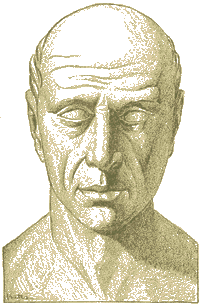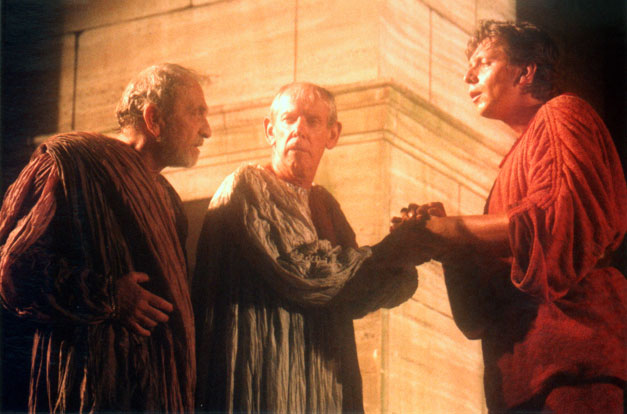 |
|
|---|---|
Terence's Adelphoe or The Brothers is a play we like a lot. Primarily because the entire point of it is a discussion of our topic. The title characters are the brothers Micio and Demea, as well as Ctesipho and Aeschinus who are Demea's sons. Micio is the older brother and is a sophisticated urbanite. His philosophy on raising kids is "the child bullied by punishment does right only if he fears he will be caught; but take such fear away, and PRESTO! he's back to his old naughty self in no time. But if you let kindness be the tie that binds he'll act sincerely, he'll WANT to return the favor, and his behavior will be the same at home or away. A parent simply must encourage virtue for virtue's sake, and not make it hang by a threat." (Ln. 68-75) Thus he is a liberal character, allowing his adopted son, Aeschinus, to do almost anything free from threat of punishment. Demea is the younger brother and a sour old farmer. He raises Ctesipho very differently from how Micio raises Aeschinus. Micio says that "he is a severely repressive, tightfisted rube, misguided in his belief that respect is more deep and durable when it's coerced than when cemented by friendship." (Ln. 64-7)
The results of these differing philosophies is shown early in the play when we learn that Ctesipho had Aeschinus steal a lute-girl from a pimp so he could be with her. He shows in this action that the harsh upbringing he had has not made him righteous, but instead made him afraid to do the dirty-deed himself. The same action also shows that Aeschinus is used to being indulged and believes in his ability to deal with the consequences, come what may. The end result of the play is that Demea learns to lighten up a little bit in dealing with life; Aeschinus learns to better regard the consequences of his actions beforehand; Micio learns that his laid-back attitude is not appropriate to all situations; and Ctesipho learns absolutely nothing on stage. This play doesn't really have one comic hero. It does have a blocking figure in the person of Demea, who keeps trying to impose his rigid morality on the rest of the family. The characters are all stereotypical because of the philosophies and consequences of philosophies that they represent. So each one is filling more of a philosophical role than a rounded character role. However, in the last act Terence tries to give the two lead brothers, Micio and Demea, a round finish. Demea realizes that he cannot always keep his son from being a youth and making his own mistakes. After coming to this realization he forces on Micio a similar realization about his son that Micio has to draw the line somewhere with regards to his liberality. The reason for this late rounding of the characters is because Terence wants to make sure we understand the moral of his play, that neither method of parenting espoused by the brothers is optimal but the true best method lies on an Aristotelian mean. |
|
Click on Pics for original site |
|
For questions or comments, please contact John Gruber-Miller |
|


